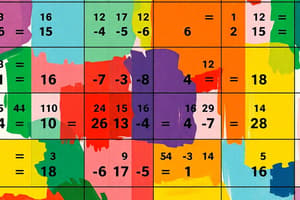Podcast
Questions and Answers
What is the purpose of calendar calculations?
What is the purpose of calendar calculations?
- To determine the time of day accurately
- To track days, months, and years in history (correct)
- To measure the distance between planets
- To predict the weather for upcoming days
In the day determination algorithm using modular arithmetic, what does Y represent?
In the day determination algorithm using modular arithmetic, what does Y represent?
- The adjustment factor for leap years
- The constant alpha
- The year (correct)
- The day code
What does the day code D represent in the day determination algorithm?
What does the day code D represent in the day determination algorithm?
- The day of the week (correct)
- The year
- The adjustment factor for leap years
- The constant alpha
Why do some years need extra days according to the text?
Why do some years need extra days according to the text?
What is the significance of Monday being assigned as 0 in the day determination algorithm?
What is the significance of Monday being assigned as 0 in the day determination algorithm?
How does modular arithmetic help in determining the day of the week?
How does modular arithmetic help in determining the day of the week?
Why is a leap year added once every four years in the Western calendar?
Why is a leap year added once every four years in the Western calendar?
If a year is divisible by 100 but not by 400 in the Western calendar, what happens?
If a year is divisible by 100 but not by 400 in the Western calendar, what happens?
What is the purpose of adding a leap year once every 3,000 years?
What is the purpose of adding a leap year once every 3,000 years?
Which key factor is crucial in determining the accuracy of calendar systems?
Which key factor is crucial in determining the accuracy of calendar systems?
How do modern digital clocks ensure high levels of accuracy in time measurement?
How do modern digital clocks ensure high levels of accuracy in time measurement?
Why was it necessary to introduce the convention of leap years in the Western calendar?
Why was it necessary to introduce the convention of leap years in the Western calendar?
Study Notes
Calendar Calculations
Calendars have been crucial throughout human history for tracking days, months, and years. They aid us in keeping records of significant moments, making plans, and understanding seasonal changes. Understanding how to calculate various aspects of calendrics is essential for navigating both historical and contemporary events.
Days of the Week
One fundamental aspect of calendrics is determining the day of the week for any given date. The U.S. Naval Observatory provides a method for doing this using modular arithmetic. By breaking down numerical values into their components and applying specific rules, one can derive the day code, which corresponds to the day of the week (with Monday being 0 and Sunday being 6):
[ D = R(\alpha + \beta \cdot Y + k \cdot M_{R}) ]
Here, ( D ) represents the day code corresponding to the day of the week, ( R ) indicates how many times a cycle repeats until reaching the current date from January 1, ( Y ) is the year, ( \alpha ) is a constant, ( \beta ) determines the adjustment factor for leap years, and ( M_{R} ) is the modification made due to the repetition cycle.
Date Patterns
Date patterns refer to the structure of days within a calendar. One common pattern is the repetition of seven days in a week. Additionally, the lengths of months vary slightly, resulting in the need for extra days in certain years. The astronomical year, referred to as the tropical year, consists of approximately 365 days plus six more hours. To account for this discrepancy, a leap year is added once every four years. However, the beginning of the year slides backward relative to the seasons by roughly eleven minutes per year. Therefore, a leap year occurs on the 15th of February once every 3,000 years.
In the Western calendar, a leap year is declared if the year is divisible by 4 unless it is also divisible by 100. In this case, however, if the year is divisible by 400, it counts as a leap year again. This convention avoids the issue where all centuries would be leap years (such as the first four centuries of Jesus Christ's life).
Determination Algorithms
Determining the accuracy of calendar systems requires careful consideration of the details involved. Key factors including the length of years, the inclusion of leap years, and the corrections needed for aligning seasons with the calendar are critical considerations.
Time and Dates
Time and dates are closely intertwined concepts, often expressed concurrently. The precision of time measurement varies depending on context and purpose. From celestial bodies' movements to atomic oscillators, timekeeping devices range in complexity and reliability. Modern digital clocks maintain high levels of accuracy, ensuring precise measurements of time intervals.
Understanding the principles underlying calendric calculations allows individuals to grasp and utilize them effectively across various disciplines—from historical research to practical planning tasks.
Studying That Suits You
Use AI to generate personalized quizzes and flashcards to suit your learning preferences.
Description
Explore the intricacies of calendar calculations, including determining days of the week, date patterns, leap years, and timekeeping accuracy. Gain insights into how calendars have evolved over time and understand the significance of aligning seasons with calendric systems.




